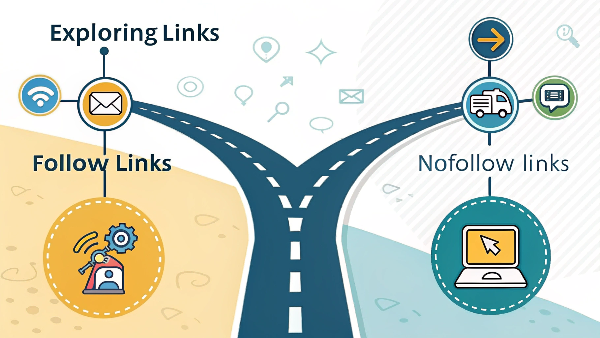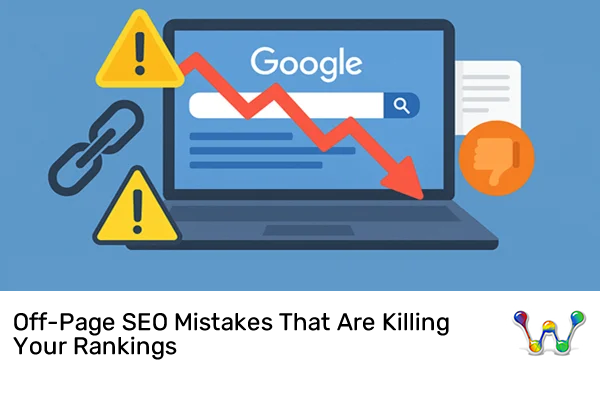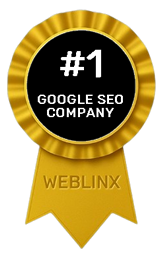Our off-page SEO services are designed to boost your website’s credibility and influence across the web. Through high-quality link building, digital PR, brand mentions, and strategic outreach, we strengthen your site’s authority in the eyes of search engines.
Off-Page SEO
£1,750.00 Original price was: £1,750.00.£1,450.00Current price is: £1,450.00.
- High-quality backlink building
- Link quality audit
- Content promotions
- Local SEO citations
- Competitor backlink analysis
Press Release
£450.00 Original price was: £450.00.£345.00Current price is: £345.00.
- We write the press release
- 750+ words
- Unique content
- Plagiarism checked
- Grammar checked
- Published on authority sites
Article Writing
£200.00 Original price was: £200.00.£175.00Current price is: £175.00.
- Grammar checked
- Article topic well researched
- Plagiarism checked
- 500+ words
- Includes sources where relevant
- Links to your website
Off-page SEO refers to all the actions taken outside of your website to improve its search engine rankings and overall online presence.
- It helps build your website’s authority and trustworthiness.
- Search engines use off-page signals to determine the relevance and credibility of your site.
- A strong off-page SEO strategy can drive more organic traffic.
- It enhances brand awareness and visibility across different online platforms.
- Engaging in off-page SEO improves your chances of ranking higher in search results.
By focusing on off-page SEO, you can strengthen your website’s reputation and improve its performance in search engine rankings.
What are the benefits?
Boosts website authority and credibility
Off-page SEO establishes your website as an industry authority. High-quality backlinks from trusted sites tell search engines that your content is worthwhile, improving ranks and user credibility.
Increases organic traffic and visibility
Backlinks, social media, and authoritative mentions expand your website's audience. Increased exposure boosts organic traffic, attracting customers and growing your company.
Enhances search engine rankings
Google ranks websites based on off-page metrics like backlinks, social signals, and brand mentions. A good off-page SEO approach helps you to rank for competitive keywords.
Check out our other SEO services
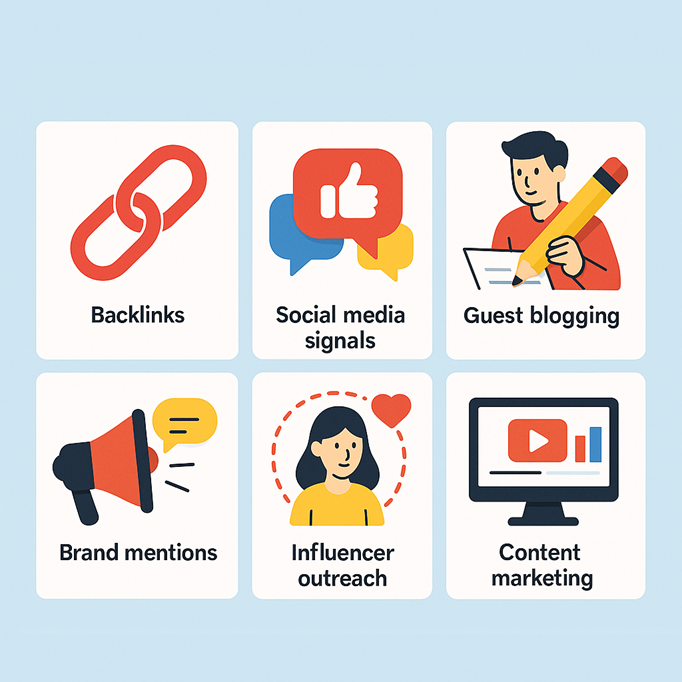
Key off-page SEO elements
Off-page SEO consists of various strategies that enhance your website’s authority, trustworthiness, and visibility beyond on-site optimisation.
- Backlinks: Earning high-quality links from authoritative websites to improve search rankings.
- Social media signals: Engaging with audiences on platforms like Facebook, Twitter, and LinkedIn to boost brand awareness.
- Guest blogging: Writing content for other websites to gain backlinks and showcase expertise.
- Brand mentions: Getting referenced online, even without a direct link, to build credibility.
- Influencer outreach: Partnering with industry influencers to expand reach and attract traffic.
- Local SEO & citations: Listing your business in directories like Google My Business to improve local search rankings.
- Content marketing: Sharing valuable articles, videos, and infographics to generate engagement and backlinks.
Mastering these off-page SEO elements strengthens your website’s reputation, helping it rank higher and attract more visitors.
Best practices for effective off-page SEO
Implementing the right off-page SEO strategies helps build your website’s authority, increase its visibility, and drive more organic traffic. Here are three best practices to follow:
Build high-quality backlinks
Earning backlinks from reputable websites signals to search engines that your content is valuable and trustworthy, helping to improve your search rankings.
Engage with others on social media
Active social media boosts brand awareness, drives traffic, and encourages sharing for more backlinks.
Make use of local SEO and citations
Listing your business on online directories like Google My Business enhances your companies local search visibility.

Mistakes to avoid
When implementing off-page SEO, avoiding common mistakes is crucial for long-term success. One major error is focusing on quantity over quality when building backlinks; acquiring links from low-authority or spammy sites can harm your rankings instead of boosting them. Another mistake is neglecting social media engagement; search engines consider social signals, and an inactive presence can limit your brand’s visibility. Ignoring local SEO is also a missed opportunity, as failing to list your business in directories like Google My Business can reduce your chances of appearing in local searches. Additionally, inconsistent brand mentions and citations across the web can confuse search engines and lower trust in your site.
By steering clear of these mistakes, you can create a strong off-page SEO strategy that enhances your website’s credibility and search performance.
Google’s algorithm impacting off-page SEO
Google is always making changes to its algorithm to make search results better. These changes can have a big effect on your off-page SEO efforts. Updates often go after low-quality backlinks, spammy link-building methods, and brand comments that don't have anything to do with the site. This means that websites that use old or dishonest methods may see their rankings drop.
On the other hand, these changes tend to be beneficial for sites that have lots of high-quality, natural backlinks and a lot of activity on known platforms. Social signals, local SEO factors, and brand authority are affecting search results more and more. It is important to know about changes to search algorithms to make sure that your off-page SEO works even as Google's guidelines change.
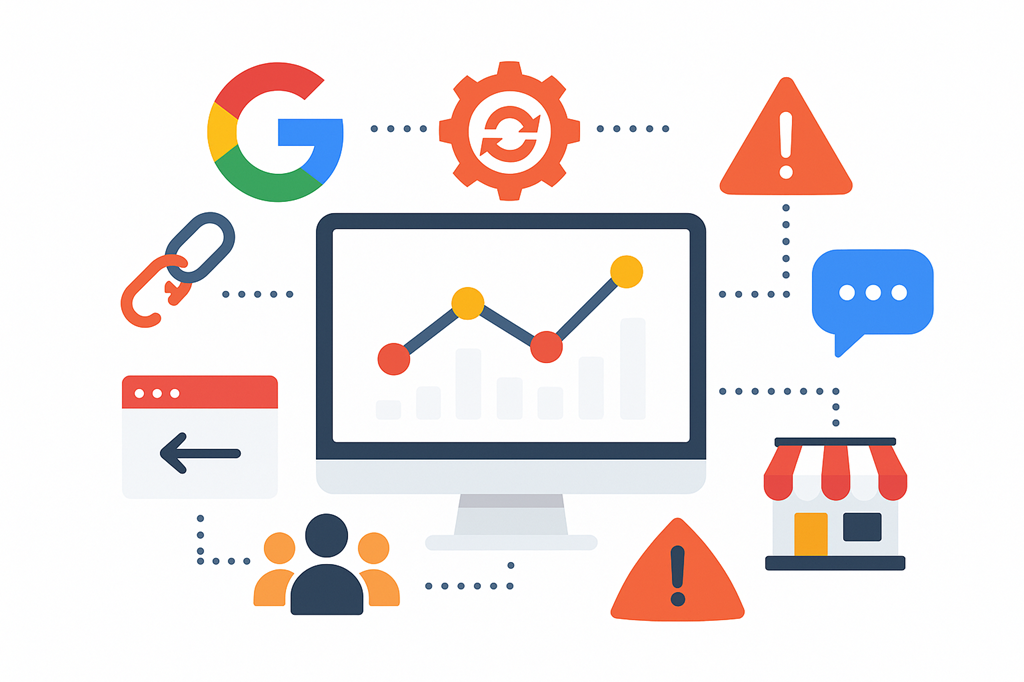
FAQ's
Your off-page SEO questions answered
Is off-page SEO still effective for SEO?
Yes, off-page SEO remains a crucial factor in improving search engine rankings. Search engines consider backlinks, social signals, brand mentions, and local SEO factors when determining a website’s authority and relevance. A strong off-page SEO strategy helps boost visibility, credibility, and organic traffic.
Can backlinks hurt SEO?
Yes, backlinks can hurt SEO if they come from spammy, low-quality, or irrelevant websites. Google’s algorithm penalises websites that engage in manipulative link-building tactics, such as buying links or using private blog networks (PBNs). To avoid penalties, focus on acquiring high-quality, natural backlinks from reputable sources.
How long does it take to see results from off-page SEO?
Off-page SEO is a long-term strategy, and results can take weeks or months, depending on factors like backlink quality, competition, and search engine updates.
Can I do off-page SEO without link building?
Yes, while backlinks are important, other strategies like brand mentions, social media marketing, and content promotion also contribute to off-page SEO success.




